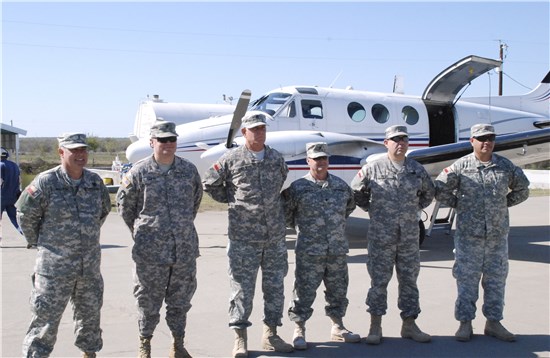 |
| On Jan. 6, 2012, Brig. Gen. William L. Smith, director Joint Staff and commander, Domestic Operations for Joint Force Headquarters of Texas (second from left) met with members of the Texas State Guard and received an overview of the annual Texas Oral Rabies Vaccination Program in Zapata, Texas. Since the program's inception in 1995, more than 39 million doses of the oral rabies vaccine, Raboral V RG, have been distributed over approximately 540,000 square miles of Texas. |
Story by Laura Lopez
ZAPATA, Texas – Members of the Texas State Guard joined forces with the Texas Department of State Health Services, the United States Department of Agriculture, as well as other local, state and federal agencies, Jan. 3-18, to participate in the 2012 Texas Oral Rabies Vaccination Program.
With 1.8 million doses of the oral rabies vaccine expected to be dropped over portions of South and West Texas, Texas State Guard soldiers with the 3rd Battalion, 1st Regiment provided both ground and air crew support that included navigational assistance, the operating and management of the bait drop and the loading of the baits onto the aircraft. A program the Texas State Guard has actively taken part in since 2007, this is one of the many humanitarian missions they are proud to be a part of.
“The 2012 ORVP mission will be an experience I will not soon forget,” said Incident Commander 2nd Lt. Stephen Walker, 3rd Battalion, 1st Regiment. “I was honored to work alongside fellow members of the TXSG, members of federal and state agencies and to serve the citizens of Texas. Such a mission truly gives the TXSG members a feeling of giving back to his or her community for such a worthwhile cause.”
Originally initiated in 1995, with the goal of creating zones of vaccinated coyotes and gray foxes along the leading edges of the epizootics, statistics from the Texas Department of State Health Services show animal cases of the canine strain of rabies in southern Texas fell from 122 in 1994 to zero in 2000 with single cases in 2001 and 2004. In addition the fox strain, prevalent in western Texas, dropped from 244 animal cases in 1995 to zero in 2010 and 2011.
A mission Brig. Gen. William L. Smith, Director Joint Staff and Commander, Domestic Operations for Joint Force Headquarters of Texas describes as important to the state of Texas, its citizens and to the Texas economy he and other representatives from the Texas Military Forces and Department of State Health Services visited the command post in Zapata, Texas, Jan. 6, for a first-hand look.
“This is another example of how we can effectively work together with our partnering agencies and benefit our citizens at a time when no disaster is present,” said Smith.
While the vaccine dose dropped is enclosed in a small packet dipped in fish oil and coated with fish meal crumbles, health services representatives say the baits do not pose any risk to humans and will not become established in the environment making the Texas Oral Rabies Vaccination Program an exceptionally safe method of controlling rabies.